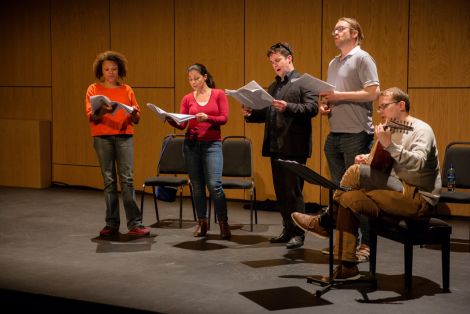Reviews / Risky but rewarding madrigals concert
SHETLAND Arts’ unconventional 2016/17 classical season ended on Friday night in Mareel, with a concert of Baroque-era madrigals that was just as unusual, writes Alex Garrick-Wright.
The Dunedin Consort presented Love’s Fire; Love’s Ashes, a programme of 14 madrigals by groundbreaking Italian composer Claudio Monteverdi, coinciding with the 450th anniversary of the composer’s birth. The critically-acclaimed ensemble, fronted by director Nicholas Mulroy, were “delighted” to be in Shetland for the first time.
The ensemble consisted of five vocalists – two female sopranos, two male bass and Nicholas as tenor – as well as the accompaniment of Toby Carr on lute. While madrigals are often unaccompanied (and several in this concert were), the programme specified that the accompaniment would be in the form of organ and theorbo – a type of really long-necked lute.
Nicholas explained that they could not get the theorbo up on the plane, and so had to make do with a regular lute – there was no explanation forthcoming for the absence of the organ, but that can’t have been easy to get on a plane either.
Although now relatively obscure, in the 16th and 17th centuries madrigals were a common type of musical performance across Europe, especially in Italy. Madrigals are, in essence, a combination of the choral tradition of ecclesiastical music with secular, humanist poetry; largely based around very human feelings such as joy and loss.
“In English, the word [‘madrigal’] gives us images of Blackadder,” said director Nicholas Mulroy. “But there is nothing at all flippant or flimsy about these pieces.”
The madrigals, in Italian with English translations in the programme provided, were drawn from different periods of Monteverdi’s work. Ecco mormorar l’onde (‘Here the waves murmur’) was drawn from book 2, a relaxing and fairly upbeat piece involving all 5 singers with no accompaniment. By contrast, Rimanti in pace (‘Peace be with you’) was a hopeless, grief-wracked lament.
Become a member of Shetland News
The vocalists were magnificent, and the most rewarding pieces were when the formula was changed, allowing different voices to come to the fore. Parlo, misero, o taccio? (the upliftingly-named ‘Shall I speak, miserable, or remain ever silent?’) worked extremely well with just two sopranos with a single bass, and lute accompaniment.
Perche se m’odiavi was another departure from the standard form. Tenor and both bass were extremely powerful, unrestricted by the softening influence of the sopranos, giving a raw and emotional performance that culminated in the final lines being blasted out into the auditorium.
Lamento della Ninfa (‘The nymph’s lament’), which Nicholas described as “one of the most enduring masterpieces in music”, was a particularly interesting piece, with soprano Rachel Redmond taking the lead. Her strong, stunning voice was the lynchpin of the entire piece, carrying the solo effortlessly, and contrasting nicely with the contrapuntal bass chiming in.
Nicholas spoke very highly of the final madrigal, Sestina, ossia Lagrime, referring to is as “one of the great works of art based on profound grief”. A tremendously sad and oppressive number written, he informed the audience, in Monteverdi’s misery after losing both his wife and the prodigal star of his new opera just days before the grand opening.
By far the longest piece, Sestina was clearly written in the throes of utter anguish. Not a moment of levity lifted the sadness that hung over this madrigal like a funeral veil. As powerful as it was sorrowful, Sestina was certainly a memorable end to the concert.
Each of the vocalists was flawless, although Redmond stood out for her spectacular performance in Lamento. It was unfortunate that the accompaniment had to be paired down, however, as the lute added little to the performances – leaving the audience to wonder what the intended accompaniment of theorbo and organ would have added.
Madrigals are, even for classical buffs, a bit esoteric. Nevertheless, it was good to see a risk being taken in having the season end in a concert that might not appeal to very many, but would be very rewarding for those who took the chance, opened their mind, and went along. One can only hope that next year’s classical season is as unorthodox as this one has been.
Alex Garrick-Wright
Become a member of Shetland News
Shetland News is asking its many readers to consider paying for membership to get additional features and services: -
- Remove non-local ads;
- Bookmark posts to read later;
- Exclusive curated weekly newsletter;
- Hide membership messages;
- Comments open for discussion.
If you appreciate what we do and feel strongly about impartial local journalism, then please become a member of Shetland News by either making a single payment, or setting up a monthly, quarterly or yearly subscription.



























































